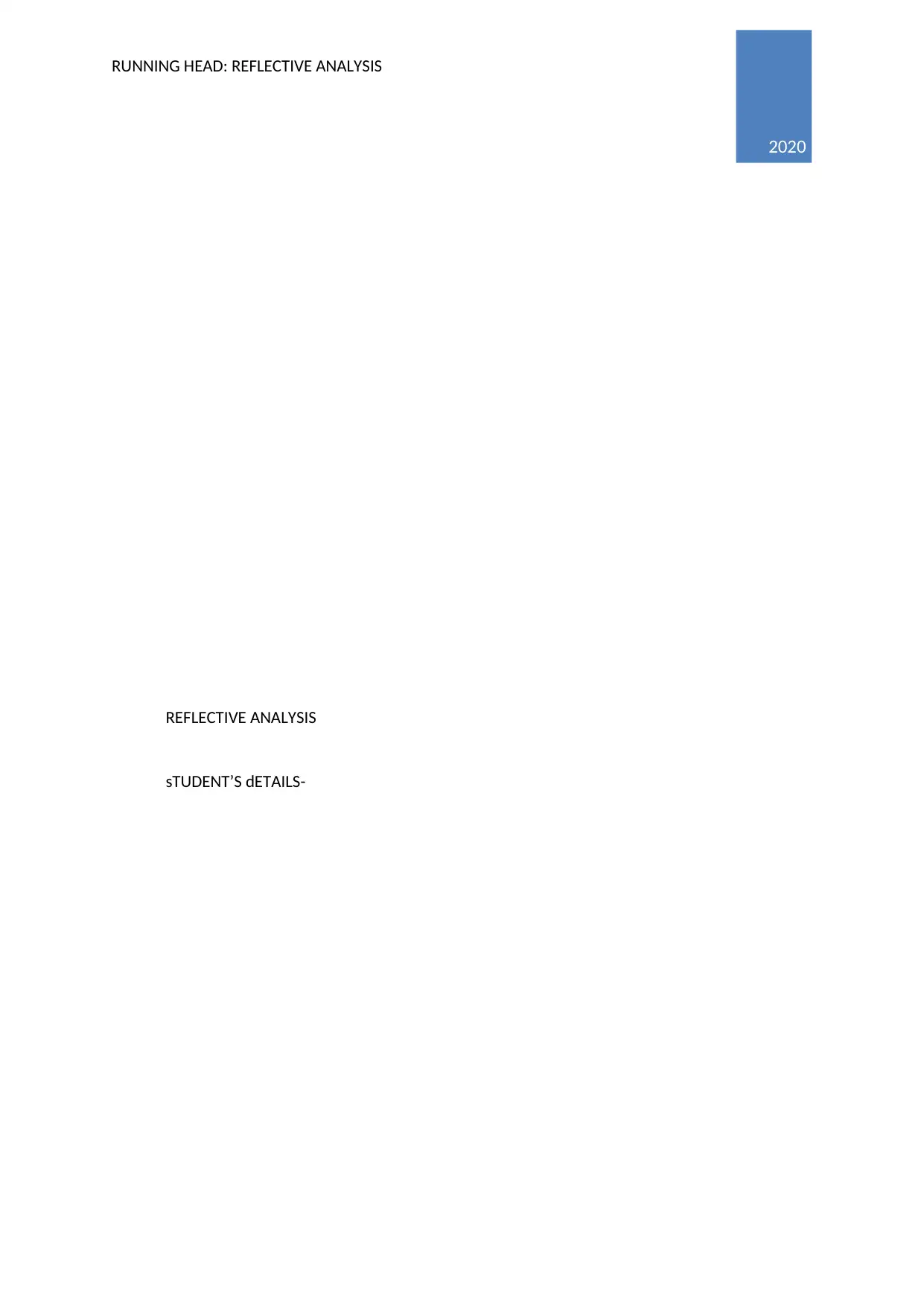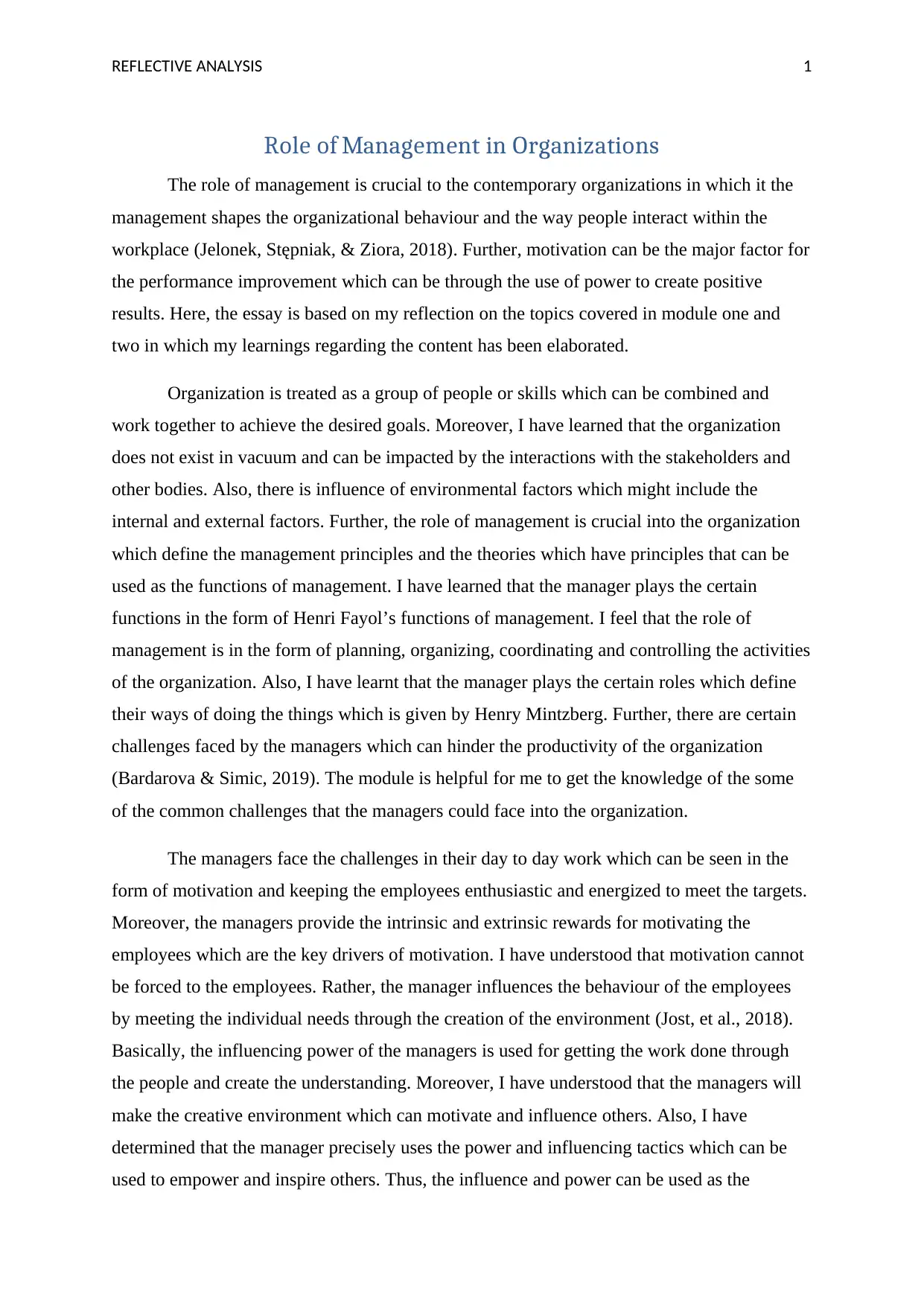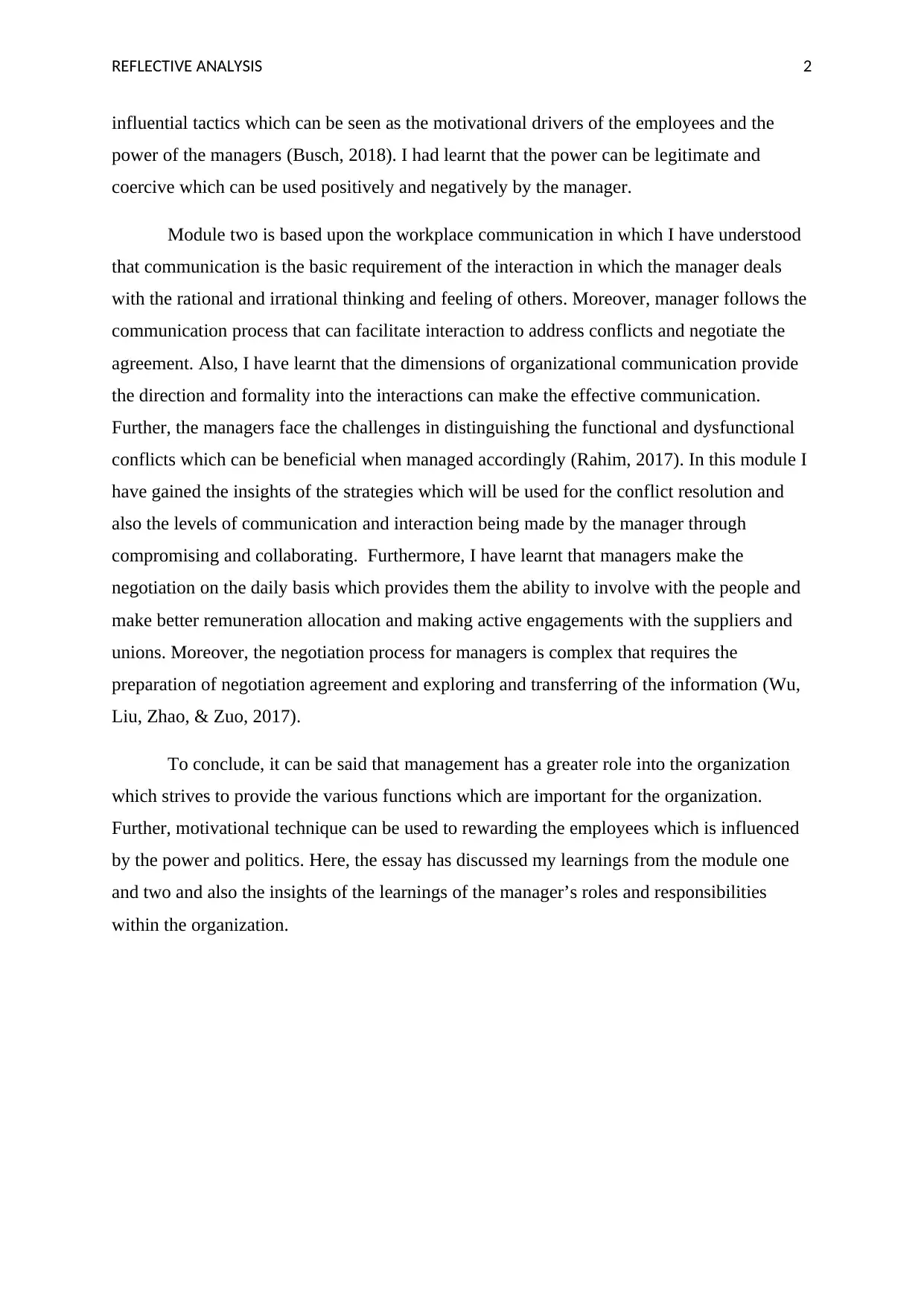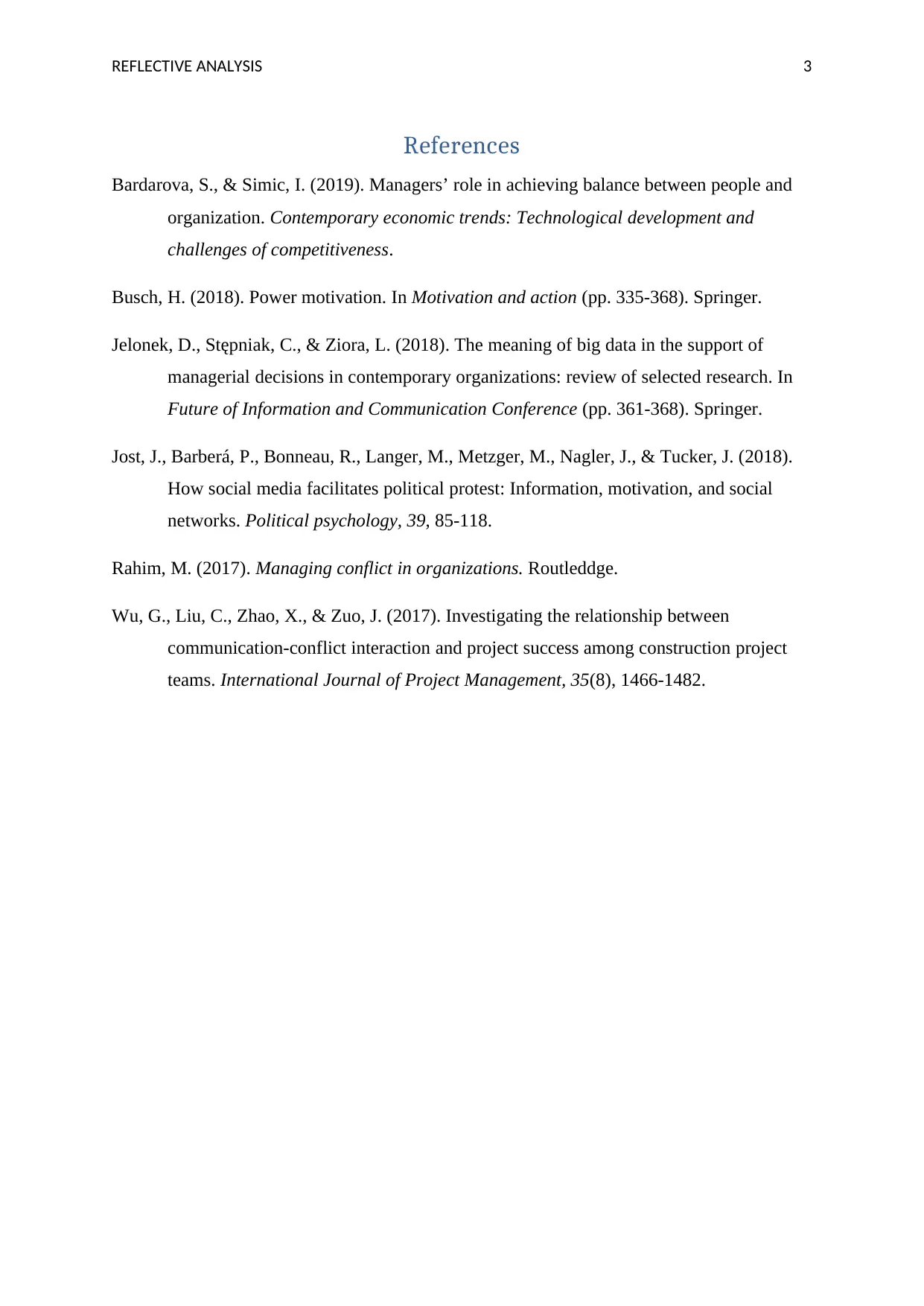Reflective Analysis on Management, People, and Teams (MGT600)
VerifiedAdded on 2022/08/13
|4
|1098
|28
Essay
AI Summary
This reflective analysis examines the roles of management within contemporary organizations, drawing upon the content of the first two modules of the MGT600 course. The analysis explores the importance of management in shaping organizational behavior, influencing employee motivation, and fostering effective communication. The essay reflects on key concepts such as Henri Fayol's functions of management and Henry Mintzberg's managerial roles, as well as challenges faced by managers, including employee motivation and conflict resolution. The author discusses the significance of power and influence in achieving organizational goals, and communication strategies for addressing conflict. The reflection emphasizes the importance of understanding organizational dynamics and applying management principles to create a productive and positive work environment. The essay concludes by highlighting the author's key learnings from the modules and their application to future managerial practice.

RUNNING HEAD: REFLECTIVE ANALYSIS 0
2020
REFLECTIVE ANALYSIS
sTUDENT’S dETAILS-
2020
REFLECTIVE ANALYSIS
sTUDENT’S dETAILS-
Paraphrase This Document
Need a fresh take? Get an instant paraphrase of this document with our AI Paraphraser

REFLECTIVE ANALYSIS 1
Role of Management in Organizations
The role of management is crucial to the contemporary organizations in which it the
management shapes the organizational behaviour and the way people interact within the
workplace (Jelonek, Stępniak, & Ziora, 2018). Further, motivation can be the major factor for
the performance improvement which can be through the use of power to create positive
results. Here, the essay is based on my reflection on the topics covered in module one and
two in which my learnings regarding the content has been elaborated.
Organization is treated as a group of people or skills which can be combined and
work together to achieve the desired goals. Moreover, I have learned that the organization
does not exist in vacuum and can be impacted by the interactions with the stakeholders and
other bodies. Also, there is influence of environmental factors which might include the
internal and external factors. Further, the role of management is crucial into the organization
which define the management principles and the theories which have principles that can be
used as the functions of management. I have learned that the manager plays the certain
functions in the form of Henri Fayol’s functions of management. I feel that the role of
management is in the form of planning, organizing, coordinating and controlling the activities
of the organization. Also, I have learnt that the manager plays the certain roles which define
their ways of doing the things which is given by Henry Mintzberg. Further, there are certain
challenges faced by the managers which can hinder the productivity of the organization
(Bardarova & Simic, 2019). The module is helpful for me to get the knowledge of the some
of the common challenges that the managers could face into the organization.
The managers face the challenges in their day to day work which can be seen in the
form of motivation and keeping the employees enthusiastic and energized to meet the targets.
Moreover, the managers provide the intrinsic and extrinsic rewards for motivating the
employees which are the key drivers of motivation. I have understood that motivation cannot
be forced to the employees. Rather, the manager influences the behaviour of the employees
by meeting the individual needs through the creation of the environment (Jost, et al., 2018).
Basically, the influencing power of the managers is used for getting the work done through
the people and create the understanding. Moreover, I have understood that the managers will
make the creative environment which can motivate and influence others. Also, I have
determined that the manager precisely uses the power and influencing tactics which can be
used to empower and inspire others. Thus, the influence and power can be used as the
Role of Management in Organizations
The role of management is crucial to the contemporary organizations in which it the
management shapes the organizational behaviour and the way people interact within the
workplace (Jelonek, Stępniak, & Ziora, 2018). Further, motivation can be the major factor for
the performance improvement which can be through the use of power to create positive
results. Here, the essay is based on my reflection on the topics covered in module one and
two in which my learnings regarding the content has been elaborated.
Organization is treated as a group of people or skills which can be combined and
work together to achieve the desired goals. Moreover, I have learned that the organization
does not exist in vacuum and can be impacted by the interactions with the stakeholders and
other bodies. Also, there is influence of environmental factors which might include the
internal and external factors. Further, the role of management is crucial into the organization
which define the management principles and the theories which have principles that can be
used as the functions of management. I have learned that the manager plays the certain
functions in the form of Henri Fayol’s functions of management. I feel that the role of
management is in the form of planning, organizing, coordinating and controlling the activities
of the organization. Also, I have learnt that the manager plays the certain roles which define
their ways of doing the things which is given by Henry Mintzberg. Further, there are certain
challenges faced by the managers which can hinder the productivity of the organization
(Bardarova & Simic, 2019). The module is helpful for me to get the knowledge of the some
of the common challenges that the managers could face into the organization.
The managers face the challenges in their day to day work which can be seen in the
form of motivation and keeping the employees enthusiastic and energized to meet the targets.
Moreover, the managers provide the intrinsic and extrinsic rewards for motivating the
employees which are the key drivers of motivation. I have understood that motivation cannot
be forced to the employees. Rather, the manager influences the behaviour of the employees
by meeting the individual needs through the creation of the environment (Jost, et al., 2018).
Basically, the influencing power of the managers is used for getting the work done through
the people and create the understanding. Moreover, I have understood that the managers will
make the creative environment which can motivate and influence others. Also, I have
determined that the manager precisely uses the power and influencing tactics which can be
used to empower and inspire others. Thus, the influence and power can be used as the

REFLECTIVE ANALYSIS 2
influential tactics which can be seen as the motivational drivers of the employees and the
power of the managers (Busch, 2018). I had learnt that the power can be legitimate and
coercive which can be used positively and negatively by the manager.
Module two is based upon the workplace communication in which I have understood
that communication is the basic requirement of the interaction in which the manager deals
with the rational and irrational thinking and feeling of others. Moreover, manager follows the
communication process that can facilitate interaction to address conflicts and negotiate the
agreement. Also, I have learnt that the dimensions of organizational communication provide
the direction and formality into the interactions can make the effective communication.
Further, the managers face the challenges in distinguishing the functional and dysfunctional
conflicts which can be beneficial when managed accordingly (Rahim, 2017). In this module I
have gained the insights of the strategies which will be used for the conflict resolution and
also the levels of communication and interaction being made by the manager through
compromising and collaborating. Furthermore, I have learnt that managers make the
negotiation on the daily basis which provides them the ability to involve with the people and
make better remuneration allocation and making active engagements with the suppliers and
unions. Moreover, the negotiation process for managers is complex that requires the
preparation of negotiation agreement and exploring and transferring of the information (Wu,
Liu, Zhao, & Zuo, 2017).
To conclude, it can be said that management has a greater role into the organization
which strives to provide the various functions which are important for the organization.
Further, motivational technique can be used to rewarding the employees which is influenced
by the power and politics. Here, the essay has discussed my learnings from the module one
and two and also the insights of the learnings of the manager’s roles and responsibilities
within the organization.
influential tactics which can be seen as the motivational drivers of the employees and the
power of the managers (Busch, 2018). I had learnt that the power can be legitimate and
coercive which can be used positively and negatively by the manager.
Module two is based upon the workplace communication in which I have understood
that communication is the basic requirement of the interaction in which the manager deals
with the rational and irrational thinking and feeling of others. Moreover, manager follows the
communication process that can facilitate interaction to address conflicts and negotiate the
agreement. Also, I have learnt that the dimensions of organizational communication provide
the direction and formality into the interactions can make the effective communication.
Further, the managers face the challenges in distinguishing the functional and dysfunctional
conflicts which can be beneficial when managed accordingly (Rahim, 2017). In this module I
have gained the insights of the strategies which will be used for the conflict resolution and
also the levels of communication and interaction being made by the manager through
compromising and collaborating. Furthermore, I have learnt that managers make the
negotiation on the daily basis which provides them the ability to involve with the people and
make better remuneration allocation and making active engagements with the suppliers and
unions. Moreover, the negotiation process for managers is complex that requires the
preparation of negotiation agreement and exploring and transferring of the information (Wu,
Liu, Zhao, & Zuo, 2017).
To conclude, it can be said that management has a greater role into the organization
which strives to provide the various functions which are important for the organization.
Further, motivational technique can be used to rewarding the employees which is influenced
by the power and politics. Here, the essay has discussed my learnings from the module one
and two and also the insights of the learnings of the manager’s roles and responsibilities
within the organization.
⊘ This is a preview!⊘
Do you want full access?
Subscribe today to unlock all pages.

Trusted by 1+ million students worldwide

REFLECTIVE ANALYSIS 3
References
Bardarova, S., & Simic, I. (2019). Managers’ role in achieving balance between people and
organization. Contemporary economic trends: Technological development and
challenges of competitiveness.
Busch, H. (2018). Power motivation. In Motivation and action (pp. 335-368). Springer.
Jelonek, D., Stępniak, C., & Ziora, L. (2018). The meaning of big data in the support of
managerial decisions in contemporary organizations: review of selected research. In
Future of Information and Communication Conference (pp. 361-368). Springer.
Jost, J., Barberá, P., Bonneau, R., Langer, M., Metzger, M., Nagler, J., & Tucker, J. (2018).
How social media facilitates political protest: Information, motivation, and social
networks. Political psychology, 39, 85-118.
Rahim, M. (2017). Managing conflict in organizations. Routleddge.
Wu, G., Liu, C., Zhao, X., & Zuo, J. (2017). Investigating the relationship between
communication-conflict interaction and project success among construction project
teams. International Journal of Project Management, 35(8), 1466-1482.
References
Bardarova, S., & Simic, I. (2019). Managers’ role in achieving balance between people and
organization. Contemporary economic trends: Technological development and
challenges of competitiveness.
Busch, H. (2018). Power motivation. In Motivation and action (pp. 335-368). Springer.
Jelonek, D., Stępniak, C., & Ziora, L. (2018). The meaning of big data in the support of
managerial decisions in contemporary organizations: review of selected research. In
Future of Information and Communication Conference (pp. 361-368). Springer.
Jost, J., Barberá, P., Bonneau, R., Langer, M., Metzger, M., Nagler, J., & Tucker, J. (2018).
How social media facilitates political protest: Information, motivation, and social
networks. Political psychology, 39, 85-118.
Rahim, M. (2017). Managing conflict in organizations. Routleddge.
Wu, G., Liu, C., Zhao, X., & Zuo, J. (2017). Investigating the relationship between
communication-conflict interaction and project success among construction project
teams. International Journal of Project Management, 35(8), 1466-1482.
1 out of 4
Related Documents
Your All-in-One AI-Powered Toolkit for Academic Success.
+13062052269
info@desklib.com
Available 24*7 on WhatsApp / Email
![[object Object]](/_next/static/media/star-bottom.7253800d.svg)
Unlock your academic potential
Copyright © 2020–2026 A2Z Services. All Rights Reserved. Developed and managed by ZUCOL.





